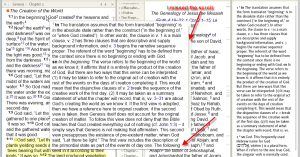
Shownotes
Welcome to Day 1529 of our Wisdom-Trek, and thank you for joining me.
This is Guthrie Chamberlain, Your Guide to Wisdom
Bible Study – Serious Study As Adults Using Footnotes – Meditation Monday
Wisdom - the final frontier to true knowledge. Welcome to Wisdom-Trek! Where our mission is to create a legacy of wisdom, to seek out discernment and insights, to boldly grow where few have chosen to grow before. Hello, my friend; I am Guthrie Chamberlain, your captain on our journey to increase Wisdom and Create a Living Legacy. Thank you for joining us today as we explore wisdom on our 2nd millennium of podcasts. This is Day 1529 of our Trek, and it is time for Meditation Monday. Taking time to relax, refocus, and reprioritize our lives is crucial in order to create a living legacy. For you, it may just be time alone for quiet reflection. You may utilize structured meditation practices. In my life, Meditation includes reading and reflecting on God’s Word and in prayer. It is a time to renew my mind, refocus on what is most important, and making sure that I am nurturing my soul, mind, and body. As you come along with me on our trek each Meditation Monday, it is my hope and prayer that you, too, will experience a time for reflection and renewing of your mind.
We are continuing our series this week on Meditation Monday as we focus on Mastering Bible Study through a series of brief insights from Hebrew Scholar, Dr. Michael S. Heiser. Our current insights are focusing on accurately interpreting the Bible. Today let us meditate on:
Bible Study – Serious Study As Adults Using Footnotes
· Insight Forty-One: Lots of Things in the Bible Can’t Be Understood by Children
I rarely watch television. It’s not because I have some pseudo pious objection to it. For me, it’s a time issue, except when it comes to sitcoms. If I were confined to a bed, I wouldn’t watch a sitcom. I used to love them as a teenager, probably for the same reasons I tend to dislike them now as a parent.
One of my irritations with the sitcom genre is how every adult is portrayed as a half-wit while the kids are endless sources of wisdom and clear-headed thinking. The only skills that mom and dad seem to have are getting into trouble and being smart enough to let their kids extricate them from their problems.
Maybe this is why one of my pet peeves is the notion that the Bible is so simple even a child can understand it. Don’t get the wrong idea—I know’ that the gospel story of Jesus really can be understood at a young age. I’m talking about more than the gospel. As someone who has taught a lot in the local church and through online forums, I’ve heard the expression stated as a duty to avoid thinking. It is implied by many who say, “I just want to love Jesus. Why are you complicating things?” I want to love Jesus too. So I might ask, “Why are you being lazy about knowing God’s Word?”
Serious Bible study takes work. It can be tedious at times. It doesn’t always provide an immediate payoff to address a spiritual struggle or answer a knotty question. Teddy Roosevelt once said, “Nothing in the world is worth having or worth doing unless it means effort, pain, difficulty... I have never in my life envied a human being who led an easy life. I have envied a great many people who led difficult lives and led them well.” I can relate to this quote. I’ve never wanted to emulate anyone who halted their study of Scripture with what their kids knew. I’ve sought to be like those who put real effort and sacrifice into the enterprise.
As Art Linkletter used to remind television audiences, “Kids say the darnedest things.” They sure do, but I’m not expecting to hear one explain why God told Samuel to deceive Saul’s men (I Samuel 16:1-5), or what Paul thought when he talked about baptism for the dead (1 Corinthians 15:29), or a long list of other things in the Bible. Discovering those answers is for adults.
· Insight Forty-Two: Don’t Ignore Footnotes

Do you remember learning to read? I have a vague recollection from the first grade of learning how to sound out letters for reading. Even if you can’t remember learning yourself, chances are you’ve listened to a small child who is learning to read sound out the words. Perhaps even helped that child learn.
Children’s storybooks follow typical patterns, patterns that persist through early grade school years. Simple one or two-syllable words predominate. Sentences are very short. Colorful pictures are illustrating the points of the story. These things would be out of place in a book intended for an adult reader. We tend to judge intelligence by the absence of these things. I know there are exceptions, but books with short words and pictures tend to be for kids.
One of the arbiters for nonfiction adult material is the use of footnotes or endnotes. We usually encounter those sorts of books in high school or college. The inclusion of footnotes presumes that the reader is not reading for casual interest but for study. This underlying assumption is also behind the inclusion of marginal notes in a Bible or more extended notes accompanying the English translation. This is the common feature of all study Bibles. Following these notes to where they lead and reading that material is one strategy for moving beyond reading into Bible study.

There are three reasons why academic writers use footnotes. If this were a quiz, I’m betting most people would get this one: writers want to tell you where they found some piece of information. They want to credit their source. Another reason is that a writer has a parenthetical thought that he or she feels might interrupt the discussion if it were added. A footnote allows a writer to include that extra thought without interrupting the flow of what’s being said. A third reason is to direct readers to additional information or resources. This goes beyond crediting a source. The writer wants the reader to know that some excellent resources will add to the discussion or maybe bolster a point. The assumption is that people who want to learn will follow the leads.
Footnotes and other notes direct the good student toward more significant progress. Don’t turn down help when it’s offered.
Study this Book of Instruction continually. Meditate on it day and night so you will be sure to obey everything written in it. Only then will you prosper and succeed in all you do.
That is a wrap for today’s Meditation. Next week we will continue our trek on Meditation Monday as we take time to reflect on what is most important in creating our living legacy. On tomorrow’s trek, we will explore another wisdom quote. This 3-minute wisdom supplement will assist you in becoming healthy, wealthy, and wise each day. Thank you for joining me on this trek called life. Encourage your friends and family to join us and then come along tomorrow for another day of ‘Wisdom-Trek, Creating a Legacy.’

If you would like to listen to any of the past 1528 daily treks or read the daily Journal, they are available at Wisdom-Trek.com. I encourage you to subscribe to Wisdom-Trek on your favorite podcast player so that each day will be downloaded to you automatically.
Thank you for allowing me to be your guide, mentor, and most importantly, I am your friend as I serve you through this Wisdom-Trek podcast and Journal.
As we take this Trek of life together, let us always:
- Live Abundantly (Fully)
- Love Unconditionally
- Listen Intentionally
- Learn Continuously
- Lend to others Generously
- Lead with Integrity
- Leave a Living Legacy Each Day
I am Guthrie Chamberlain….reminding you to ’Keep Moving Forward,’ ‘Enjoy your Journey,’ and ‘Create a Great Day…Everyday’! See you tomorrow!